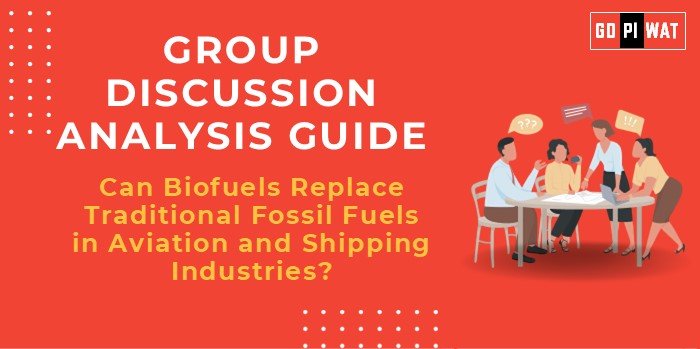📋 Group Discussion Analysis Guide: Can Biofuels Replace Traditional Fossil Fuels in Aviation and Shipping Industries?
🌍 Introduction to the Topic
Opening Context: The global aviation and shipping sectors contribute nearly 5% to the total global greenhouse gas emissions. As decarbonization efforts intensify, biofuels have emerged as a viable alternative to traditional fossil fuels, promising reduced environmental impact.
Topic Background: Biofuels, derived from organic materials like crops, algae, and waste, are seen as key to achieving net-zero emissions. Over the past decade, initiatives like the Carbon Offsetting and Reduction Scheme for International Aviation (CORSIA) have spotlighted biofuels in sustainable energy discussions.
📊 Quick Facts and Key Statistics
- 🌿 Global Biofuel Production: Reached 150 billion liters in 2023, representing 4% of global fuel demand.
- 🌎 Emission Reduction Potential: Sustainable aviation fuels (SAFs) can lower carbon emissions by up to 80%.
- 💰 Cost Challenges: Biofuels cost 3-4 times more than conventional fuels, limiting scalability.
- ✈️ Adoption Rates: Airlines like United and KLM are integrating biofuels into 10-15% of their fuel mix.
🌐 Stakeholders and Their Roles
- Governments: Provide subsidies, set regulations, and fund research for biofuel technologies.
- Private Sector: Airlines and shipping companies invest in sustainable fuels and infrastructure.
- Environmental Groups: Advocate for cleaner fuels and monitor their ecological impact.
- International Bodies: Organizations like CORSIA and IMO work on global standards and frameworks for biofuel adoption.
✅ Achievements and Challenges
🏆 Achievements
- Pioneering Initiatives: Airbus conducted the first A380 flight using 100% SAF in 2022.
- Infrastructure Growth: SAF production facilities expanded by 20% in 2023.
- Legislative Push: EU mandates SAF usage at 2% by 2025.
⚠️ Challenges
- Cost Barrier: High production costs impede large-scale adoption.
- Feedstock Availability: Limited sustainable feedstocks may create competition with food production.
- Technological Hurdles: Issues in adapting engines for 100% biofuels.
🌍 Global Comparisons
- Success: Finland leads SAF production, covering 5% of aviation fuel demand.
- Lag: Developing nations struggle due to inadequate infrastructure.
📖 Case Studies
- ✈️ Norwegian Airlines: Operating with a 50% SAF blend since 2021.
- 🚢 Maersk: Launched the first carbon-neutral container ship using biofuels.
📚 Structured Arguments for Discussion
- Supporting Stance: “Biofuels provide a sustainable pathway to significantly cut emissions in aviation and shipping.”
- Opposing Stance: “High costs and feedstock scarcity make biofuels an impractical solution for global adoption.”
- Balanced Perspective: “While biofuels are promising, their success hinges on overcoming economic and technological barriers.”
💡 Effective Discussion Approaches
- Opening Approaches:
- Fact-Based: “The aviation sector contributes 2.1% of CO₂ emissions; adopting biofuels can drastically lower this footprint.”
- Contrast: “While biofuels reduce emissions, their scalability remains questionable due to cost and resource constraints.”
- Counter-Argument Handling:
- Use data to showcase progress, e.g., “Biofuel costs are projected to drop by 20% by 2030 with increased production.”
- Reference successful examples like Finland’s SAF initiative.
📈 Strategic Analysis of Strengths and Weaknesses
- Strengths: High emission reduction potential, renewable sources, global support.
- Weaknesses: High costs, feedstock competition, limited scalability.
- Opportunities: Innovation in production technology, policy incentives, global climate commitments.
- Threats: Economic feasibility, competition from electric or hydrogen fuels.
🎓 Connecting with B-School Applications
- Real-World Applications:
- Finance: Impact on carbon credit markets.
- Operations: Sustainable supply chain design.
- Development: Policies for green logistics.
- Sample Interview Questions:
- “How can public-private partnerships drive biofuel adoption?”
- “What are the economic implications of replacing fossil fuels in aviation?”
- Insights for B-School Students:
- Focus on renewable energy financing models.
- Explore supply chain efficiencies in biofuel distribution.
- Study international case studies of biofuel adoption.


